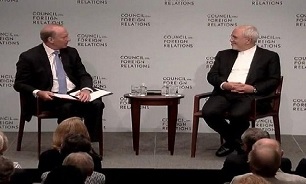Foreign interventions play big role in regional anger, dissatisfaction
 Mohammad Javad Zarif discussed current developments in the
Middle East in a meeting presided by Richard N. Haass, the President of the
Council on Foreign Relations.
Mohammad Javad Zarif discussed current developments in the
Middle East in a meeting presided by Richard N. Haass, the President of the
Council on Foreign Relations.
"We see foreign interventions that play a big role in the anger and dissatisfaction that leads to extremism," Zarif said in an explanation of the cause of continued instability in the Middle East.
He added that US war in Iraq had some consequences, one of which was the spread of extremism in the region.
Zarif noted that US has followed the policy of system change in Iran since the Islamic Revolution, adding it has not learned from the past.
In response to a question by President of the Council on Foreign Relations Richard Haass on the instability of Middle East region, comparing to Asia, Europe, Latin America and Africa, Zarif blamed both "foreign intervention" and the failure of Arab governments to provide their people with their "basic needs," as the key reasons for all the anger and frustration that has led to the rise of extremism in the Middle East.
He asserted that Iranian nation lined up for ten hours to vote, and in Los Angeles they lined up for four hours to vote in the recent presidential election as this was their avenue to express themselves, which does not exist in other countries of the region.
Zarif also called the current fighting in Yemen the "worst humanitarian nightmare you can think of" and said he hoped it would not escalate into full-scale war between Iran and Saudi Arabia.
"We certainly hope that if we don't agree with each other about the situation in Yemen or about the situation in Syria we can still work with each other in order to bring those situations to an end," Zarif said at the Council on Foreign Relations in New York City.
The top official also shunned reports that Iran effectively controlled Iraq after the US-led invasion, instead mandating that his government is against the presence of foreign militaries anywhere in the region; "when ISIL terrorist network was close to encroaching the semi-autonomous Kurdish region in Iraq in 2014, its president, Masoud Barzani, made three calls for help, to the US, Turkey and Iran, and it was Iran who came to their assistance in just two hours with advisors and planes of weaponry.
The minister additionally indicated that Israel is not Iran's immediate concern, but expressed dismay over the continued "repression of the Palestinian people" and denied the claims that Iran was developing missiles to carry nuclear warheads, which is prohibited under the reigning nuclear deal.
"We need them to make sure that another Saddam Hussein around the corner will not come and hit us again," he said, reiterating several times that Iran is committed to never producing nuclear weapons even after the deal expires in just over ten years.
Zarif also expressed his serious skepticism that the Syrian President Bashar al-Assad had used chemical weapons in the country's northwestern rebel-held town of Khan Sheikhoun in April this year; "I have serious doubts... And no one has a red-line (on the use of chemical weapons more than Iran. When we were victims, nobody cared," he said, referencing the Iran-Iraq war in which Iraq's dictator Saddam Hussein dropped an array of chemical concoctions on Iranian combatants and non-combatants in the 1980s.
Iran’s FM Zarif and his accompanying delegation left Tehran for New York on Thursday to take part in the UN meeting of the high-level political forum. Zarif is scheduled to hold talks with a number of officials and prominent figures participating in the international event.
